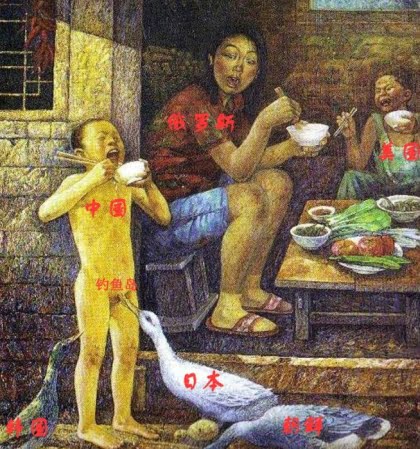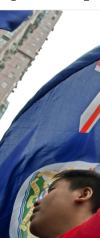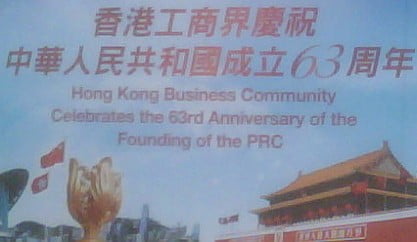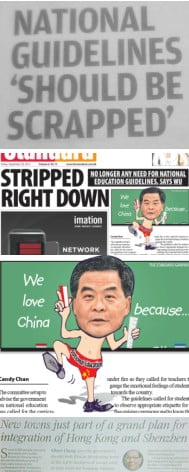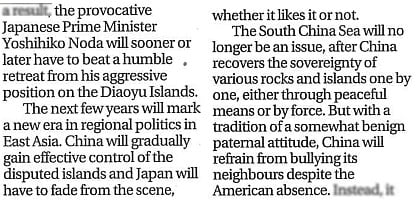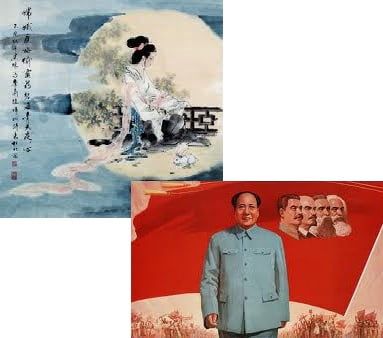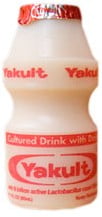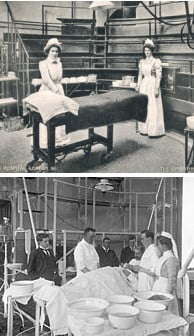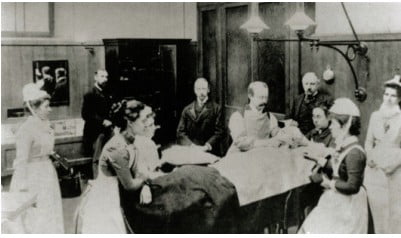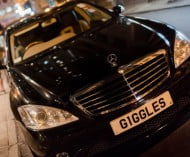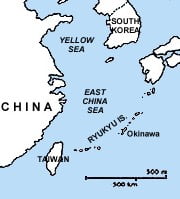To no-one’s great surprise, the Hong Kong government formally shelves the Moral and National Education Curriculum Guide. The phrase ‘formally shelves’ is a little face-saver for an administration that had insisted MNE was essential and then backed down in the face of 12-year-old schoolgirls. After looking around, 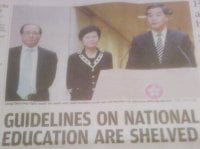 carefully surveying the thousands of tiny pieces strewn on the ground, and organizing a committee to ponder what to do next, Education Secretary Eddie Ng concedes that MNE will never fly. (Let’s acknowledge the plucky little Fresh Fish Traders School at Tai Kok Tsui, where national education will go ahead regardless, to spice up their regular classes in garoupa-gutting and sea bass-filleting.)
carefully surveying the thousands of tiny pieces strewn on the ground, and organizing a committee to ponder what to do next, Education Secretary Eddie Ng concedes that MNE will never fly. (Let’s acknowledge the plucky little Fresh Fish Traders School at Tai Kok Tsui, where national education will go ahead regardless, to spice up their regular classes in garoupa-gutting and sea bass-filleting.)
Not everyone is happy. Ng at one point essentially blamed the pro-Beijing teachers’ group and the infamous China Model booklet for this debacle. Their member of Anna Wu’s Committee on Implementation [sic] of MNE abstained from voting on scrapping the thing in a huff. Opponents of despotism should recognize the vital role played by the pro-Beijing groups themselves in undermining MNE. Give them enough rope… This fits in with loyalist mentality; for fear of being accused of insufficient patriotism, you go too far. In its wildest dreams, the Democratic Party would never hope of turning school kids into dedicated anti-communists, and these clowns do it with one silly booklet.
It would be in keeping with the Big Lychee’s civil society activists to keep fighting on an obscure point of principle, and maybe launch a judicial review or two. According to the Economist’s obituary, Eric Hobsbawm claimed that “Next to sex … there was nothing so physically intense as ‘participation in a mass demonstration at a time of great public exaltation’.” The Marxist historian had a point. As anyone who was on the 2003 July 1 march knows, it feels good. You want to do it again, and the danger is that (like many later July 1 demonstrations) it becomes self-indulgent and embarrassing. It seems that the anti-MNE forces are going to accept the ‘formal shelving’ as the interment is really is and let the administration deal with its shame. It’s not like there won’t be more struggles to come.
It would be nice to think that the government will learn a lesson, and that Beijing’s emissaries here will too. But which lesson? CY Leung can console himself that this is another leftover from predecessor Donald Tsang. Pro-Beijing all-purpose busybody Rita Fan satisfies our constant curiosity about her latest thoughts by declaring that CY shouldn’t blame Sir Bow-Tie. We can safely conclude that he can and should, though it seems he won’t. He is being given some good advice: stick to the things people want – cheaper homes and fewer Mainland tourists – and everyone will love you, eventually, and all will be harmony.
As for Beijing officials, we can only guess what they are thinking. The rebellious Harbour Folk, manipulated by evil British and Americans, send hordes of vicious, Hello Kitty-wielding teenagers in middle-school uniforms to overthrow the city’s Party-appointed leadership. Do you decide to try subtlety for a change and back off and go easy on the Mainlandization so they calm down? Or (for fear of being accuse of insufficient etc) do you decide that they must be crushed and made to see and confess the error of their ways?
Art corner… poking around obscure parts of the Internet, I accidentally discovered this:
(Duck = Japan; naked boy = China; boy’s ‘little brother’ = Diaoyu Islands; woman = Russia (why?); laughing kid = US; other ducks = Koreas.)
What intrigues me is the original painting. Who did it? Where does it come from? Is it part of a series? Having lost the original url, I turn to a similarity-based image search engine, a Google for pictures rather than words, and it finds that I am not alone in being curious (the French poster wittily suggests the title Noodle Eaters). But we are none the wiser. That site has the original with no adornments, in case anyone wants to add labels indicating which features in the picture relates to CY, national education, Beijing, anti-MNE activists, etc.

